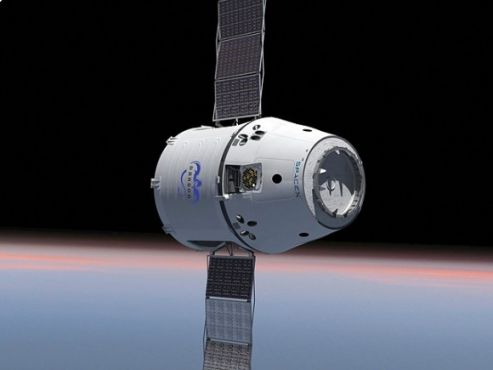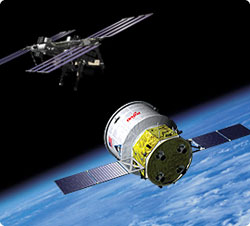The private companies will jointly launch 20 unmanned spacecraft and each of them at least 20 tons of cargo to the space station, after the shut down of the shuttles

Two start-up companies dealing in the field of commercial launches into space have won contracts from NASA to provide a supply service to the International Space Station. SpaceX, also known as Space Exploration Technologies won a $1.6 billion contract while Orbital Sciences of Dulles, Virginia won a $1.9 billion contract.
NASA ordered 12 flights from SpaceX and eight from Orbital. At the International Symposium for Personal and Commercial Space Flight, the Vice President of Marketing and Communications at SpaceX, Diane Murphy, said that the company, which was founded six years ago, plans to launch cargo to the space station as early as 2009.
Currently, the aforementioned contract is for unmanned cargo flights. However, SpaceX's Dragon capsule and Falcon 9 launcher are rated as suitable for manned launches and are planned to be able to carry a crew of up to seven people to the space station. The Dragon can also be used as an escape spacecraft. If the two companies manage to upload supplies to the station, this could be the way to a potential solution to the gap between Retiring the ferries in 2010 and between the start of service of the Constellation program, hopefully in 2015.
The SpaceX team is proud to have been selected by NASA as the winner of the supply service contract for the space station," said Elon Musk, CEO and CTO of SpaceX. "This is a wonderful opportunity, given the soon approaching shutdown of the shuttles and the significant future needs of the space station. It also underscores the success of NASA's COTS program that ushered in a new era for US commercial spaceflight.

"We greatly appreciate NASA's confidence in giving us the opportunity to provide commercial cargo services to and from the space station, beginning with our demonstration flight scheduled for late 2010," said David Thompson, chairman and CEO of Orbital. "The CRS program will serve as a demonstration of the type of commercial service that private space companies in the US can offer to NASA, allowing the space agency to allocate a higher proportion of its resources to the challenges of manned spaceflight, deep space exploration and scientific research of the planets and the universe we live in." said. Orbital will use a space vehicle known as Cygnus to transfer the payloads and they will be launched on a Taurus rocket which the company also developed.
The two contracts, the advantage of which for NASA is that their cost is known in advance and that the companies assume the risks, will begin on January 1, 2009. The contracts are valid until December 31, 2016. The contract requires that at least 20 tons of equipment can be uploaded to the station with each launch. The contract also allows NASA to require non-standard services to support supply to the station including economic analysis and special missions when the government deems them necessary.
NASA has established contract review milestones to track the progress of service delivery. The maximum value of each contract is about 3.1-3.5 billion dollars. These agreements will allow NASA to upload cargo to the space station after the shutdown of the shuttles.

9 תגובות
I am very interested in space and have ever wanted to go there and see the universe and explore everything that is in space
I just thought (until now) that the company that built Spaceship-1 was the leading private company in the world in the field of non-government funded space launches and therefore I expected that NASA would choose them for help, and not some unknown companies there that I had never heard of before.
What doesn't work out, they deal with unmanned flights compared to Scaled Composite which builds a manned spacecraft.
I don't understand, if these two companies have better capabilities than the company that built Spaceship and 2, then why haven't we heard about them until now? And why didn't they win the X-Price award but rather the company that built Spaceship-1? Something here doesn't add up to me.
So let's add Floflor, what's the problem 🙂
And in general this is a right and wise step. If the space business will move to the business sector
The matter will begin to gain momentum. Business companies by nature try to leverage
capabilities and maximize benefits creatively orders of magnitude more than government organizations.
will see..
Yes, because Spaceship 2 - the commercial spacecraft of Scaled Composite only reaches a height of 100-120 kilometers and immediately descends back, on the other hand, the space station is in its orbit much higher, about 500 kilometers. To get there you need orbital and not sub-orbital capability as Spaceship 2 has
Can someone explain why they didn't choose the company that built SpaceShipOne at the time?
Can someone explain why they didn't choose this company?
http://www.haaretz.co.il/hasite/pages/ShArt.jhtml?itemNo=441629&contrassID=1
What is the difference between the 2 companies? Why do 12 flights of spaceX cost less than 8 flights of the competing company?